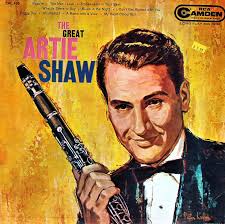
Daily Dose Of Jazz…
Artie Shaw was born Arthur Jacob Arshawsky on May 23, 1910 in New York City to Austrian and Russian Jewish parents Sarah and Harold Arshawsky, a dressmaker and photographer. He grew up in New Haven, Connecticut, where his natural introversion was deepened by local antisemitism. Buying a saxophone by working in a grocery store and began learning the saxophone at 13. At 16, he switched to the clarinet and left home to tour with a band.
From 1925 to 1936 Shaw performed with many bands and orchestras, working in Cleveland, Ohio and establishing a lasting reputation as music director and arranger for an orchestra led by violinist Austin Wylie. Exposed to symphonic music while playing with Irving Aaronson’s Commanders, which he later incorporated in his arrangements. In 1932 he joined the Roger Wolfe Kahn Orchestra and made several recordings. Three years later he gained attention with his “Interlude in B-flat” at a swing concert at the Imperial Theater in New York. During the swing era, his big bands had numerous popular hits with Begin the Beguine, Stardust and others.
In addition to hiring Buddy Rich, he signed Billie Holiday as his band’s vocalist in 1938, becoming the first white band leader to hire a full-time black female singer to tour the segregated South. However, after recording Any Old Time, Holiday left the band due to hostility from Southern audiences, as well as from music company executives who wanted a more mainstream singer.
He fashioned a smaller band within the orchestra in 1940, naming it Artie Shaw and the Gramercy Five after his home telephone exchange. Over time members of the band were pianist Johnny Guarnieri, electric guitarist Al Hendrickson, trumpeter Roy Eldridge succeeded Billy Butterfield, Oran “Hot Lips” Page, Max Kaminsky, Georgie Auld, Dave Tough, Jack Jenney, and Ray Conniff. In 1940, the original Gramercy Five cut eight sides, then Shaw dissolved the band in early 1941.
The long series of musical groups Shaw subsequently formed included Lena Horne, Helen Forrest, Mel Tormé, Buddy Rich, Dave Tough, Barney Kessel, Jimmy Raney, Tal Farlow, Dodo Marmarosa, and Ray Conniff.
Throughout his career, Shaw formed big bands for his radio broadcasts, made several musical shorts for Vitaphone and Paramount Pictures, and played with Navy personnel during World War II. Active until 1954, his music was used in several films, he had numerous talk show appearances, came out of retirement in 1983 and put together one last band.
Clarinetist Artie Shaw, who received a Lifetime Grammy Award in 2004, died on December 30, 2004, aged 94.
More Posts: bandleader,clarinet,history,instrumental,jazz,music


